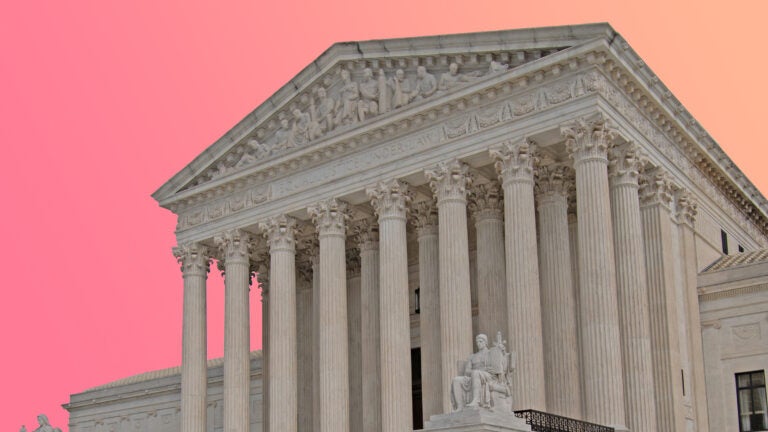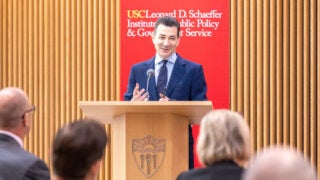
On June 24, 2022, the Supreme Court ended constitutional protections for abortion that had been in place nearly 50 years. (Photo/iStock)
The Supreme Court’s ‘Dobbs’ ruling, 2 years later: It’s about more than just abortion
The rollback of Roe v. Wade added fuel to a contentious nationwide debate that now extends well beyond the right to terminate a pregnancy. USC experts discuss Dobbs’ lasting impacts and potential influence in the November election.
Two years have passed since the U.S. Supreme Court’s landmark decision in Dobbs v. Jackson Women’s Health Organization, which overturned Roe v. Wade and ended federal protections for abortion rights that had stood for over half a century.
The ruling triggered a flurry of state-level legislative actions, creating a patchwork of laws significantly impacting reproductive freedoms once guaranteed at the federal level. What began as a legal challenge over abortion rights has morphed into a mosaic of partisan initiatives spanning access to contraceptives, emergency medical care and even in vitro fertilization, raising broader questions about women’s bodily autonomy.
“When we trace the long arc of history, we see rights advancing on some fronts while regressing on others. Sometimes, the arc of justice bends in the right direction. But as someone who studies law and feminism, it’s concerning to see the current movement toward regressing women’s rights, particularly their sexual and reproductive freedoms,” said Aya Gruber, the Harold Medill Heimbaugh professor of law at the USC Gould School of Law.
Impact on reproductive care and legal uncertainty
Last week, the U.S. Supreme Court unanimously rejected an effort to restrict access to mifepristone — one of the most widely used abortion medications in the country, accounting for 63% of all U.S. abortions in 2023.
“The Supreme Court gave women’s bodies a momentary reprieve from further regulation by the government by dismissing the mifepristone case on the ground that the activist doctors lacked standing,” said Gruber, an expert in criminal law and procedure, violence against women and feminist legal theory.
“What the public needs to understand is that this is a procedural ruling and not a proclamation that the distribution of mifepristone is lawful or that birth control is protected by the constitution,” she said. “Plaintiffs with standing may lodge the same challenge that the [Food and Drug Administration] lacked authority to approve mifepristone.”
Other battles are being waged. The Supreme Court is deliberating on another abortion case regarding whether a federal law on emergency treatment at hospitals overrides state abortion bans — such as Idaho’s Defense of Life Act — in rare emergency cases where a pregnant patient’s life is at risk.
“Additionally, pro-life groups are resurrecting an 1800s obscenity law, the Comstock Act, to argue for a national ban on abortion and ‘abortifacient’ drugs, equipment and even information,” Gruber said. “This fight is far from over.”
Other experts agree.
Dima Qato, an expert in health policy, pharmacoepidemiology, drug safety and health disparities, emphasized that the Dobbs has not only impacted access to abortion care, forcing many women in restrictive states to travel out-of-state or self-manage an abortion, but has also threatened access to contraception, which is critical to the prevention of pregnancy in states where legal abortion is no longer an option.
“Efforts to expand and protect access to emergency contraceptives — the only safe and effective option to prevent a pregnancy after contraceptive failure, unprotected sexual intercourse or rape — should be a priority for many federal and state policy and public health officials in the post-Dobbs U.S.,” Qato said.
Qato is the Hygeia Centennial Chair and associate professor at the USC Alfred E. Mann School of Pharmacy and Pharmaceutical Sciences and a senior fellow at the USC Schaeffer Center for Health Policy & Economics.
Will abortion on the ballot trigger a national reckoning at the polls?
In November, residents in Colorado, Florida, Maryland and South Dakota will vote on abortion access initiatives, with six other states advancing similar measures.
John Matsusaka, an expert on direct democracy and a professor of business, law and political science at USC, emphasized the potential of state ballot initiatives and referendums in a 2022 op-ed for Politico titled “Let the People Decide on Abortion.”
According to Matsusaka, these initiatives empower citizens to directly influence policy, offering a powerful mechanism to counter legislative decisions they oppose.
“Opinion surveys on abortion tell us that most Americans favor a compromise policy somewhere in between what the activists on both sides want — legal abortion in the early stages of pregnancy, with increasing prohibitions as the fetus becomes viable,” said Matsusaka, executive director of the Initiative and Referendum Institute at USC, which studies and tracks ballot measures and propositions throughout the country.
“If legislators take abortion policy in an extreme direction, a real risk in this age of hyper-polarized parties, initiatives and referendums let voters steer policy back toward the center,” he said.
Jane Junn, an expert on political behavior, and polling methods and analysis, added that there is widespread support for reproductive rights across gender lines in the U.S.
“Contrary to common speculation, American women are not the only ones in favor of policies protecting a right to choice, and there is little variation between the sexes in terms of support for abortion rights,” said Junn, the USC Associates Chair in social sciences and professor of political science and gender and sexuality studies at the USC Dornsife College of Letters, Arts and Sciences.
“Indeed, a majority of Americans of all sexes support reproductive freedom. The most substantial variation is by partisanship, with Republican-affiliated voters more supportive of abortion restriction,” she said, adding that even states with strong Republican majorities such as Kansas have supported policies to protect abortion rights following Dobbs.
“Having lost the right to choice at the federal level is a rallying point for Democratic Party voters, and will likely enhance turnout among these Americans on Election Day in November.”
Featured Experts
Jane Junn
Expert in California politics, including gubernatorial and congressional elections, public opinion, polling methods and analysis, women in politics, racial and ethnic politics, the politics of immigration, political behavior, independent voters and voter demographics
John G. Matsusaka
Expert in Election 2016, political economy, government budgets, taxes, spending, corporate and industrial organization: restructuring, mergers and acquisitions, divestitures, diversification and initiatives, referendums and other ballot propositions
Dima Qato
Expert in adverse drug events and medication side effects, pharmaceutical policy both in the U.S. and globally, pharmacy services, health disparities, pharmacy access/medication access and pharmacy deserts, pharmacoepidemiology and drug utilization research, polypharmacy, pefugee and immigrant health, health and human rights and essential medicines policy



